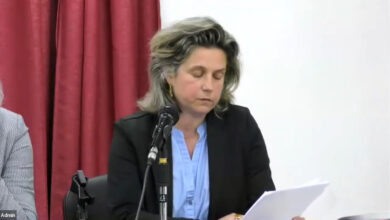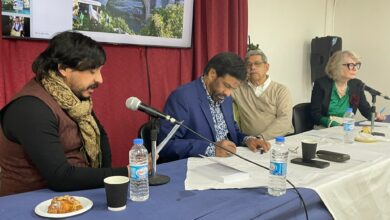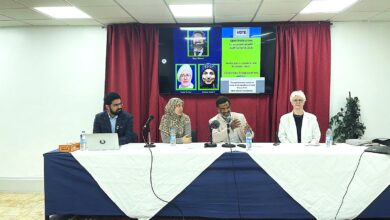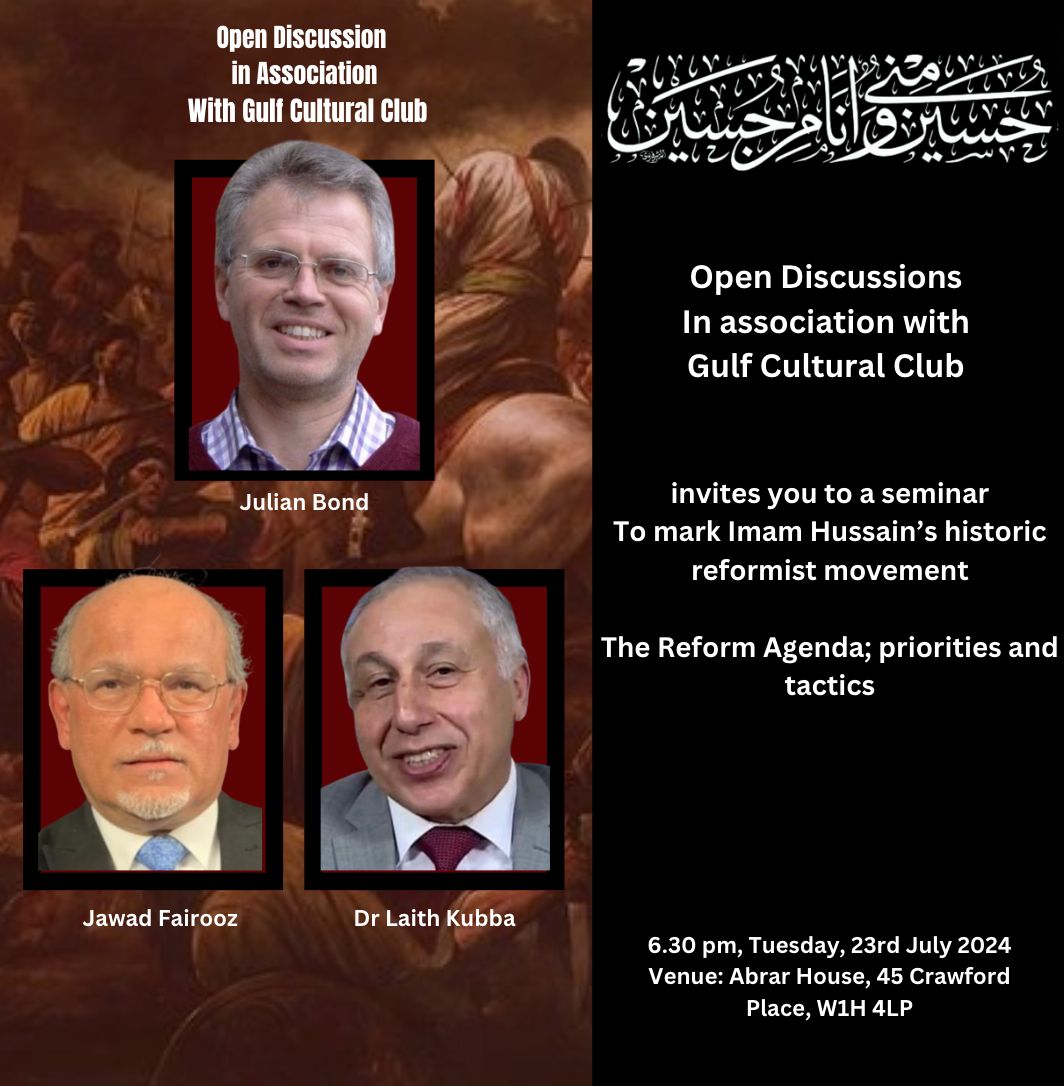
To mark Imam Hussain’s historic reformist movement
The Reform Agenda; priorities and tactics
Open Discussions/ Gulf Cultural Club
To mark Imam Hussain’s historic reformist movement
The Reform Agenda; priorities and tactics
Tuesday 23rd July 2024
*Dr Laith Kubba
(Thinker, commentator)
Julian Bond
(Interfaith activist)
**Jawad Fairooz
(Former MP, human rights activist)
Reform is what noble people will undertake as the agenda of their lives. Societies aspire to march forward from their static position to achieve progress and development. When Prophet Mohammed departed this life he left behind a newly-formed entity that would expand beyond the borders of Arabia. In the following fifty years the state expanded outward but was susceptible to internal problems including corruption. In the year 60 AH Imam Hussain, Prophet Mohammed’s grandson declared his revolt against the Umayyad dynasty, raising the banner of Reform. He said: I have left (Mecca) seeking reform of my grandfather’s community (state). The ruler, Yazid sent his army to obliterate the household of Mohammed, slaughtering Hussain and 72 of his relatives and supporters. In this context the seminar will deliberate on the question: What price reform?
Dr Laith Kubba: 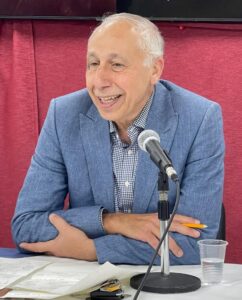 I hope my contribution to the topic would probe a little beyond just endorsements and reflections and maybe try to map out a little bit deeper into this event, powerful event, the growing phenomenon all to do with the event in Kerbala and the stand that Imman Hussein took.
I hope my contribution to the topic would probe a little beyond just endorsements and reflections and maybe try to map out a little bit deeper into this event, powerful event, the growing phenomenon all to do with the event in Kerbala and the stand that Imman Hussein took.
The theme of this evening is also related to reform, which as it happens is one of the most used phrases currently in the UK and in Europe and it takes such different shapes. Maybe a quick mapping out of current concerns that dominate the scene would help and then we shift the thinking of this talk into Kerbala and Iman Hussein.
As we know the progress of humanity over the last three to four thousand years took place because of reformers. The Quran talks about the prophets and messengers pushing the topic of reform gently and trying to introduce something better to societies which they might resist and reject and elites and tyrants might resort to power. But it is a constant feature in the Quran that you see reformers pushing an agenda.
If you read history objectively: European history, Muslim history any history throughout the globe progress happens either gradually through education through good work or it happens from time to time when something more radical needs to happen in order for reform to be born.
Within the very broad context of Ibrahimic faith which is half the planet earth – Muslims and Christians. All historians refer to Jesus Christ as a reformer who came with Judaism. And Jewish literature in a very minor way references Jesus as a minor rebel who came to their places or worship and created havoc and they have to report him to the authorities. But what happened to Jesus and the crucifixion and that event had hit a global psyche not only locally in Palestine at that time but it resonated until today and it has a deep connection and a whole industry: popes, churches, pastors are around that story and that impact not necessarily aligned with the message of Jesus. Sometimes very much contradictory to the message.
And if you look today at the Evangelist movement in America which is a very strong movement in support of Trump. This supports some of the values of Christianity but it ignores other values. And I think the reference to Gaza to me is a striking example. How can you be a Christian and you just ignore that massacre?
So there is that parallel which I want to talk about in the Muslim world and in the non-Christian world. Christ is an example. And his story the blood, the suffering relates to a very large population of Christians today.
But sometimes you wonder in the emotions and rituals where is the message of Christ? And I think that parallel in the Muslim world is with Kerbala. I see no other symbol in Muslim history closer to that other than what happened in Kerbala and how it shaped the psyche and the emotions of so many Muslims.
If you were to ask today the theme of reform is pushing all societies. You ask most people let us say non-Muslim people – does that event in Kerbala relate at all to reform to society to our concerns today I would assure you that 99 percent would say ‘no’. They just don’t see the connection. And although they have all these ceremonies in London and increasing visuals that dramatize the reaction of the Shia Muslims, the Sufis and broadly Muslims I would say the message of Kerbala is not there.
I think maybe we owe it to Imam Hussein to his family to shed more light on the message rather than focus on the drama, the emotions and the rituals. I think it not fair, not only not right, that we put all our energies purely on the symbolism without shedding more light on the message. To me this is important.
If you were to ask 99 percent of Shias what is the message of Imman Hussein in Kerbala what was the message I am not very sure you will get a clear answer. I would dare to say that 99 percent would not get it right. If that powerful event cuts deep into the emotion and the psyche of people that is a global and historical and powerful and growing yet the message if not a clear one.
Whose fault is that? It is not the fault of the people. Who wouldn’t respond to the drama of what happened in Kerbala? People will respond with their basic hearts and minds. But in terms of shedding light on the message itself I think there is a huge gap. It think it is important for forums like this to shed light on the message.
In the days I was raised in Iraq the occasion of Muharram and Ashura had a good 60 to 40 percent balance with 60 percent emphasis on the message and 40 percent emphasis on the emotions and the rituals and on other things. Today unfortunately that has shifted a long way and that is part of the problem and part of the challenge that we face today.
Let me talk a little about Kerbala and the event and try to understand the message and then I would like to see how relevant that message is to reform efforts not only in the Muslim world. I would not go as far as to say the globe. I would say there are similarities between Imam Hussein and other past and even current reform leaders. They have some similarities and there are some features that are very unique to Imam Hussein and are not shared by others.
I referenced Jesus. Jesus is a prophet. Imam Hussein is the grandson of the Prophet. He was raised in the household of the Prophet and a believer in the line of Imman Ali, Imman Hassan and his role. This is what we need to understand more and more.
Trying to focus on the message and differentiate it from the emotions and the drama and the dogma and all the generalisations and the emotions and the drama is quite a delicate process. It needs the hand of a surgeon who will try to do the operations of enhancing the understanding without actually causing to much bleeding or to much pain to the patient. We need to handle it with care.
What do we now about Kerbala? We know that it took place 50 years after the death of the Prophet. At that time Iman Hussein was six years old. The main events that happened is that in 23 years there were very powerful texts that created a change in believers and created a very powerful impact on the Arab peninsula. The momentum of it was unstoppable for 200 – 300 years. A very powerful message. It is the nature of the message that left the issue, the most important issue, what to do after the prophet.
The issue of Kerbala. The concepts that are mentioned in the Quran are about three or four on governance and about ten or 12 on politics in general. In governance, there is the concept of shurah or baya the concept of obedience. These are the core concepts that were mentioned. And with all the references from the prophet about Imam Ali and his attributes, his history for whatever reason the baya did not end with Imam Ali after the death of the Prophet and that created an issue. He was in the best position with a reference from the prophet yet this did not happen. And whatever happened Imam Ali went along with it. So there was continuity until it came to him and he was the Imam.
He faced a huge challenge because things were distorted at the time. And Imam Ali continued on the line of the prophet if it meant internal wars. He did not shy away from internal wars if that is what it took to adhere to the line of the prophet until he was wounded. This is very important. He asked would we follow Imam Hassan after you, your son. Your right hand man. And he said it is for you to decide if you give him baya or if you give it to somebody else. And he gave his wasiya to Imam, Hassan. If I die you take the punishment of executing the one who killed me and if I live I will take care of it. And then he wrote his wasiya to Iman Hasan to do whatever he wants to do with personal issues.
And after his death the Muslims made baya to Imam Hassan so he became a legitimate leader. And the fight that took place with Muawiya there was a lot of bleeding and there was negotiating and Iman Hasan decided that he would make a truce on conditions. Muawiya agreed to the conditions and that truce lasted throughout the rule of Muawiya for ten years. Imam Hassan died and Muawiya was still ruling.
One of the articles in that truce was that baya should go back to the Muslims and Muawiya has no right to assign power to anybody. And those were the articles. And of course, Imam Hussein obeyed. And after the death of Imam Hassan, Imam Hussein continued to obey and honour that truce. It took legitimacy because Imam Hasan endorsed it. And when Muawiya died he basically, voided that contract and he assigned it to Yazid. A lot of Muslims said this is in violation of the contract and letters were sent to Imam Hussain to say we give baya to you to stand and to become the leader of the Muslims.
And two things made Iman Hussein move. The first one was that Yazid was unqualified and in many ways he was a non-believer. Imam Hussein had to respond to people giving him baya and once people gave him that baya it was his duty to respond. He wasn’t seeking power. He wasn’t seeing imam-ship, he was not playing politics. In the same way that Iman Ali when people asked him to rule when Uthman was killed he said I will only accept that baya on the condition that I will get things back to how they were at the time of the Prophet. If you agree with that I will accept baya. They agreed and when he wanted to implement some things they protested again.
This is the background where Imam Hussein took his stand. Yazid started working very quickly to undermine the baya of Imam Hussein and the people in Kufa reneged on their pledge and he was surrounded. He was basically going back to Medina and he started saying that okay my baya is reneged by the people who asked me. I go back to Medina. They said you don’t go back you must give baya to Yazid. And this is where he took the stand. He said no this is deviating from the line. I will not do it. He told his family to leave and said this is between me and Yazid and they all stuck by him and it was very brutal and very emotional.
The message of Imam Hussein was he was in line with Imam Hassan, with Imam Ali with the Prophet and with the Quran and that is the message of Imam Hussein. If it takes that sacrifice between what baya is, what power is, what is the correct path even if it costs you your life. And he took that stand 1000 percent.
Now after Imam Hussein took that stand that value that stand was so clear. It was a departure in Muslim history because after Yazid all the rulers were from father to son irrespective of qualifications, irrespective of baya. And this violated a fundamental tenant in the Quran. It is violating the message of Islam. It has nothing to do with the challenges about what happened after the prophet and why the tribal culture and the fights between the tribes – these are details.
The essence of it is that Yazid violated a core principle in the Quran and Iman Hussein’s blood marked that violation until today. That event inspired a historical movement. Until today you can look at states being based on the blood of Imam Hussein including the Abassids. They were the people who defeated the Amawis and later violated the message of Imam Hussein. All their slogans were that they wanted to revenge for Imam Hussein.
All the Abbasid slogans were that they wanted to avenge for Imam Hussein and they wanted to continue the line of Imam Hussein but when the saw power they changed and this is the lesson. The genuine people who adhere to the line are very few indeed.
Now I talked about pre Kerbala, pre Imam Hussein very quickly. My time is not allowing me to talk about post Kerbala because between Kerbala until today there were many Shia states and many Shia societies that emerged and the big question is if you want to take Imam Hussein, Iman Hasan, Imam Ali as a yard stick and measure those states. There are other states.
And we have to use Imam Hussein yardstick to measure ourselves and our societies, our politics, how do we act. I hope some of your questions will give me the chance to elaborate on this.
Julian Bond: 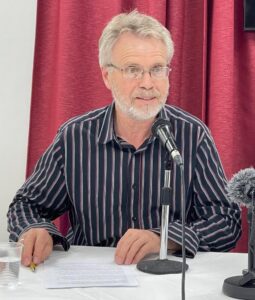 Reform is what noble people undertake as the agenda of their lives … In the year 60 AH Imam Hussain, Prophet Mohammed’s grandson declared his revolt against the Umayyads, raising the banner of Reform. He said: I have left (Mecca) seeking reform of my grandfather’s community. Yazid sent his army to obliterate the household of Mohammed, slaughtering Hussain and his relatives and supporters … What price reform?
Reform is what noble people undertake as the agenda of their lives … In the year 60 AH Imam Hussain, Prophet Mohammed’s grandson declared his revolt against the Umayyads, raising the banner of Reform. He said: I have left (Mecca) seeking reform of my grandfather’s community. Yazid sent his army to obliterate the household of Mohammed, slaughtering Hussain and his relatives and supporters … What price reform?
Reflecting on the massacre of Imam Hussain and his family, a week after Ashura I’m reminded of this hadith – “The best Jihad is to speak a word of justice to an oppressive ruler.” This is what Imam Hussain did. It also gives me the thought, rather like Jesus’ (pbuh) saying, ‘you have heard it said, but I say’ – the best jihad is telling haters that jihad really isn’t what they think it is! Islam really is about liberation and is an anti-oppression movement, something it has in common with the Jewish religion – ‘let my people go’ (Exodus 5.1), ‘let the Children of Israel go with us, and do not oppress them.’ (Q 20.47). Islam must be about reform.
But this isn’t where I started. I asked myself, what do people say about ‘reform’ these days? There has been political noise about it recently in the run-up to the General Election with The Reform Party. I didn’t pay too much attention at the time, even though Nigel Farage seemed to be everywhere, unfortunately – is the best jihad for media channels not to give him too much sensationalist airtime?! It would be better for us to hear more about the Green Party. Though I try not to be political.
Having had the thought, I checked out the Reform Party’s policies (this isn’t an advert for them!). It’s couched in the language of the imagination (a deconstructive clue perhaps that these are people who cannot deliver …), no particular concern for truth and sounding just a little bit oppressive, a manifesto for the beginnings of tyranny … Perhaps I am showing respect by quoting accurately (truthfully) the pledges from their ‘contract’ with the electorate:
- Imagine Smart Immigration, Not Mass Immigration: All non-essential immigration frozen to boost wages, protect public services, end the housing crisis and cut crime.
- Imagine No More Small Boats in the Channel: Illegal migrants who come to the UK will be detained and deported …
- Imagine No NHS Waiting Lists: Still free at the point of delivery, healthcare needs reform to improve outcomes … Tax breaks for doctors and nurses to tackle the staffing crisis.
- Imagine Good Wages for a Hard Day’s Work: Lift the income tax starting threshold to £20k … This takes 7 million of the least well-off out of Income Tax to make work pay and get people off benefits.
- Imagine Affordable, Stable Energy Bills: Scrap energy levies and Net Zero to slash energy bills …
The Qur’an is wise to their game – ‘When it is said to them, “Do not spread disorder on the earth”, they say, “We are but reformers.” (Q2.11) I can’t help making the observation that not long after being elected, Nigel Farage went to the USA to support Donald Trump’s election campaign …
I reflected on the five pledges and whether they could provide a structure for my talk, but in fact they have little to do with reform. Immigration seems a good place to start for obvious reasons, scripture has plenty of material on this. While noting that, following my conversion to Islam, I am now an insider in two religions and two sets of scripture, though I wasn’t really an outsider before.
‘Anyone who migrates for God’s cause will find many a refuge and great plenty in the earth, and if anyone leaves home as a migrant towards God and His Messenger and is then overtaken by death, his reward from God is sure. God is most forgiving and most merciful.’ (Q 4.100) – This has implications for the treatment and welcoming of migrants, and for law and national boundaries. I was unfriended recently on Facebook for being pro-immigrant, I could hardly be anything else, he didn’t see it that way.
‘Do good to your parents, to near of kin, to orphans, and to the needy, and to the neighbour who is of kin and to the neighbour who is a stranger, and to the companion by your side, and to the wayfarer, and to those whom your right hands possess. Allah does not love the arrogant and the boastful,’ (Q 4.36)
18 who executes justice for the orphan and the widow, and who loves the strangers, providing them with food and clothing. 19 You shall also love the stranger, for you were strangers in the land of Egypt. 20 You shall fear the Lord your God; him alone you shall worship; to him you shall hold fast, and by his name you shall swear. (Deuteronomy 10) Again, we find the Bible saying the same thing as the Qur’an. It is tied in with liberation from oppression, with prayer and remembrance of God. This is the opening of Moses’ covenant speech to the people of Israel.
Here it is repeated, or reiterated, in the Qur’an: [recall] when We took the covenant from the Children of Israel, “Do not worship except Allāh; and to parents do good and to relatives, orphans, and the needy. And speak to people good [words] and establish prayer and give zakāh.” Q 2.83
In our scriptures, thinking about migrants/immigrants (which is more than anti-immigration campaigners do) is rooted in God and God’s love and provision and from there to our own turning towards God and devotion to God. This route map is a reform agenda. Predictably, perhaps, this is the divine intention and plan: ‘O humanity! Indeed, We created you from a male and a female, and made you into peoples and tribes so that you may ˹get to˺ know one another. Surely the most noble of you in the sight of Allah is the most righteous among you.’ (Q 49.13)
As I said earlier, Islam must be about reform – for liberation, against oppression; for people, against tyrants; for humanity, against inhumanity. This is the natural state of humanity, God sends prophets and scripture to remind us, because we have forgotten. You can see Donald Trump doing this in a recent video where he calls immigrants – people – ‘animals’ and not human beings. What does God say? – Surely Allah enjoins justice, kindness and the doing of good to kith and kin, and forbids all that is shameful, evil and oppressive. He exhorts you so that you may be mindful. Q 16.90 – God says, kindly and lovingly, don’t forget!
A Christian tweeted this on Sunday in response to Trump – Whether it’s economic immigrants, people without a home, disabled, gay or unborn babies, Christians must carry on speaking the truth that humans are immensely valuable, made in the image of God, despite our sin We mustn’t let the noisy political narrative deprive us of this truth Our identity is neither progressive nor conservative. We are citizens of heaven @Windy_London
I am reminded, by God, by myself, not to talk about this without talking about myself, without asking about my own reform, inshallah. Not to go into a long story of conversion and personal details, but to say that I have been on my own journey of reform over the last year. I have no right to bang on about Farage and Trump if I haven’t done my own work, of self-development. Reform only happens more widely if I do my own reform first, regular prayer is a starting point, as it often says in the Qur’an. I hold onto it and ask how does it shape me and my life, my interactions with others?
hold firmly together to the rope of Allah and do not be divided. Remember Allah’s favour upon you when you were enemies, then He united your hearts, so you—by His grace—became brothers [and sisters]. And you were at the brink of a fiery pit and He saved you from it. (Q 3.103)
I hope I have time to squeeze in some reform priorities:
- Poverty
- Racism, bigotry and sectarianism
- War and violence
If we truly achieved reform it would have nothing to do with the Reform Party and would not look like their manifesto!
Unexpectedly, perhaps, I close with the Apostle Paul writing to early Christians in Rome, sounding not unlike some parts of the Qur’an.
9 Let love be genuine; hate what is evil, hold fast to what is good; 10 love one another with mutual affection; outdo one another in showing honour … 12 Rejoice in hope, be patient in suffering, persevere in prayer. 13 … extend hospitality to strangers.
14 Bless those who persecute you; bless and do not curse them. 15 Rejoice with those who rejoice, weep with those who weep. 16 Live in harmony with one another; do not be haughty, but associate with the lowly; do not claim to be wiser than you are. 17 Do not repay anyone evil for evil, but take thought for what is noble in the sight of all. 18 If it is possible … live peaceably with all. 19 … never avenge yourselves, but leave room for the wrath of God … 21 Do not be overcome by evil, but overcome evil with good. (Romans 12)
Jawad Fairooz: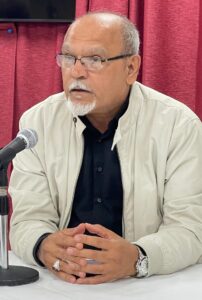 I think it is a very good opportunity that at least once a year we can focus altogether and try to understand the message of Iman Hussein. It is known that after leaving Mecca Imam Hussein wrote a will. Regarding the uprising in Kerbala he said I have not risen up for any self-glorification or seeking pleasure or for any corruption but I have risen to seek reform in the ummah of my grandfather Prophet Mohammed.
I think it is a very good opportunity that at least once a year we can focus altogether and try to understand the message of Iman Hussein. It is known that after leaving Mecca Imam Hussein wrote a will. Regarding the uprising in Kerbala he said I have not risen up for any self-glorification or seeking pleasure or for any corruption but I have risen to seek reform in the ummah of my grandfather Prophet Mohammed.
As we already understand and agree that the movement of Iman Hussein was to bring reform. The methodology that we use to commemorate this event – is it party of the reform or do we just agree on certain types of rituals which started to become like customs. They are like rituals that we do and gradually there has been a shifting from the main message.
Maybe now in Christianity you can see how Halloween has ended up separating the birth of Jesus to become business orientated rather, then the message and concepts of Jesus. So here is my focus. If we maintain all the main pillars. If we can maintain the main message through authenticity and renovation. For me this renovation is essential but at the same time should not be far away from the traditions which people used to practice. Ashura and others.
This is a short introduction. If you want to understand the event of Kerbala we have to relate it to what happened earlier and what happened after. Just through that angle I can mention three major events that are co-related directly.
The day the prophet assigned Imam Ali as a successor should be remembered because that is the beginning of the struggle that took place in the Islamic world and led to Kerbala. And later on after Kerbala I believe that the day Imam Mahdi was born – 15th Shaban. That is another special event because it is a continuation of the message of Imman Hussein. So from the day of Kerbala to the day of Imam Mahdi that is going to be a complete cycle, the completion of how we want to look at the message of Imam Hussein. How it was, how it happened and how it will end up.
As we know we are practising Islam as a thought or as a belief. It is enough you say the shaddah, or you believe in God or you believe in justice or you believe in the day after. These are theoretical. But if you want to be a real Muslim in physical worshipping for sure you have to pray, you have to be in jihad and so on. So there are certain types of physical acts by Muslims to indicate that they are true Muslims.
I think in a similar way we have to understand the Iman Hussein uprising. It is not enough just to believe him that he already acted against Yazid. A certain historical event happened 14 centuries back. But is it affecting our individual life? Do we take his principles? Do we apply whatever Imam Hussein demanded? So this for me is as important as believing in the message itself.
Believing in the message is not enough. You have to practise it. When Iman Hussein rose up against Yazid he was not just indicating some rejection of the types of control and corruption. He wanted to give an alternative model. He wanted to have this faith for sure. He wanted to show that the Islamic way of running the country was different as his father tried to show. This type of ruling to be implemented is something physical to be taken up, some legislation to be passed, some models to be implemented.
I think sometimes we are not implementing this when we are commemorating Ashurah. It is good that we can beat our chests and try to grieve and cry for what happened emotionally but that is not the whole picture which can be summarised as a circle. Each one taking one part of the circle, one part of the pie. If you take a small angle it will not show the whole circle. The whole circle should combine emotions. The history is part of the circle. But another part of the circle is how you are going to take the message and implement it in your life. How we take it as values and morals? How can we take it to try and establish justice in society?
So through that complete pie you can have a full understanding of Imam Hussein. But just to take one angle it will not give you the right direction. If we are going to shift the history of Imam Hussein as intellectuals or we are going to it from different angels what happened in history that will deviate from the message. So we have to combine both: emotional and at the same time the traditional way. But at the same time we have to have some renovations on how we are practising Ashura.
There is saying I believe that if we don’t renovate we vanish. Any actions, any traditions if they don’t try to renew it will not remain and there will be no continuation of it. So in the events of Ashura we can have a lot of renovations: IT, AI different technologies, different modern arts. So the message of Ashra is not just for the Shia community – it is an international message.
So we have different types of communities. How can we deliver this message with a very clear innovation. I think many Shia communities are delivering the message according to their own traditions. They are not thinking what is the best tradition to deliver which will impact the communities. We deliver it in our own traditions. As usual the Shia communities are attracting their own nations mostly. The international message of Iman Hussein is not being spread and we have to ask what is the way to spread it and to attract different societies with their own traditional ways. This is very important.
Another point if we believe we totally want to have stability and security and find the answer to many challenges we are facing in this world we have to provide solutions. There is poverty, there is the issue of housing – if we can raise the case of Iman Hussein. He is trying to find a solution to all these problems. Sustainable development – insisting on providing health care, education a good environment, so existence.
Can we reflect the message of Iman Hussein through this? I think we should. There are Waqf Hussein to which people contribute their money and so on. All these funds are being contributed through certain Islamic centres. Why don’t we allocate these funds to higher education? Why do we not allocate these financial resources to some health care centres? Why don’t we allocate some to these funds to build some houses for the needy people? Why don’t we expand this idea for blood donations on the day of Ashura.
It is very important that we can adopt these innovation ideas and try to spread them and introduce Iman Hussein as a global leader and how he instructed to live on this earth, peacefully, securely with dignity and with co-existence.
And my last message is whatever we believe about the struggle in Palestine for sure it is directly linked to Kerbala. We have to denounce the genocide that is going on in Gaza, totally the road to Kerbala will lead to Jerusalem. Whoever is trying to commemorate Iman Hussein cannot forget about the victims in Gaza and in Palestine.
*Dr Laith Kubba is the Director of the Quran Education Foundation (QEF). He was formerly director of international relations at the Al-Khoei Foundation in London, a global charity and faith-based endowment, and founded the International Forum for Islamic Dialogue (IFID), a London-based network of open-minded Muslim activists and intellectuals. He regularly contributes to global media talks on democratization in the Middle East and North Africa, Islam and democracy, and politics in Iraq. Dr. Kubba holds a B.A. from the University of Baghdad, Iraq, and a Ph.D. from the University of Wales, UK. He was senior advisor to Iraqi Prime Minister and a spokesman for the Iraqi government. He was also a senior director for Middle East and North Africa programs at the National Endowment for Democracy.
**Julian Bond is Funding Officer at The Methodist Church and was the former (founding) Director at Christian Muslim Forum. He studied Theology at Aberystwyth University (1986) and Post Graduate research at the University of Gloucestershire. Last year he adopted Islam but is still active within the Christian circles. He has spent many years as an interfaith activist bringing people of different faiths together.
***Jawad Fairooz is former Bahraini MP (2006 to 2011), the chairman and founder of SALAM for Democracy and Human Rights based in London. He was an elected councillor and vice-chairman of the Northern Municipality Council from 2002 to 2006. He is a human rights defender and advocate of democratic change and reform. Jawad is currently a member of UNHCR Global Alliance to End Statelessness, Apatride Network, MENA Statelessness Network (HAWAITI), advisory board member of the Institute on Statelessness and Inclusion (ISI), the EUROPEAN Network on Statelessness, and ALQST (Saudi Human Rights NGO). He holds a BSc degree from the University of Texas, USA, and a Diploma in Business Administration from Bahrain University.


